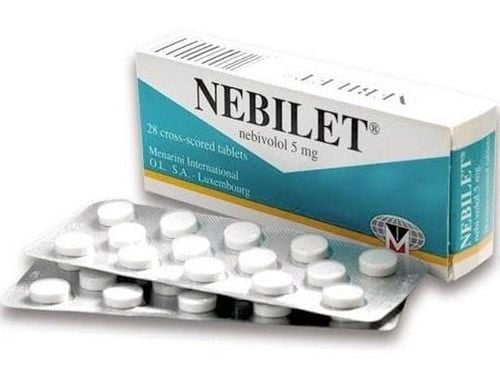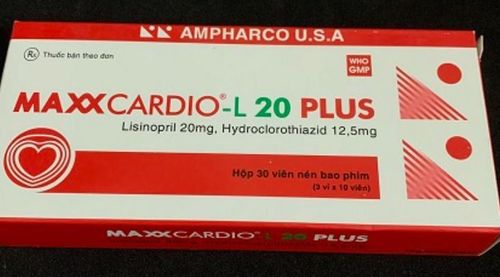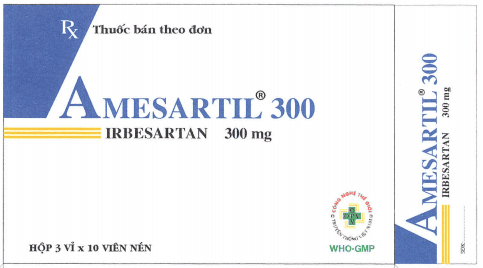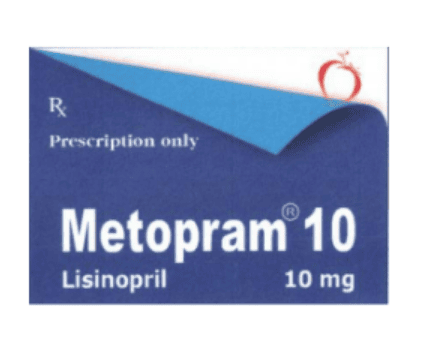This is an automatically translated article.
Lisbosartan is a drug used to treat primary hypertension and kidney disease caused by type 2 diabetes.... So what is Lisbosartan? How to use notes? The following article will help you better understand the uses of Lisbosartan.
1. What are the uses of Lisbosartan?
1.1. What is Lisbosartan? Lisbosartan is a cardiovascular drug - Drug Visa Number / Registration Number / SKU: VN-17858-14 manufactured by West Pharma-Producoes de Especialidades Farmaceuticas, S.A (Fab) – Portugal. Lisbosartan contains Irbesartan 300mg and is packaged as
1.2 film-coated tablets. What is Lisbosartan used for? Mechanism of action:
Lisbosartan blocks the AT1 receptor of angiotensin -II which helps to block the full effect of angiotensin-II mediated by the AT1 receptor, regardless of the source or pathway of angiotensin-II synthesis. Selective angiotensin-II (AT1) receptor antagonism increases plasma resin and angiotensin-II concentrations, and decreases plasma aldosterone concentrations. Clinical efficacy:
Hypertension: Irbesartan lowers blood pressure with minimal change in heart rate in rats. The dose-dependent decrease in blood pressure tended to be stable at doses above 300 mg once daily. Doses of Lisbosartan 150-300 mg once daily resulted in a good average reduction in sitting and lying trough blood pressure (ie, 24 hours after dosing) of 8-13/5-8 mmHg (systolic/diastolic). than those taking a placebo. Hypertension and kidney disease in people with type 2 diabetes: Lisbosartan reduces the course of kidney disease in people with chronic renal failure and proteinuria. Lisbosartan is indicated in the treatment of essential arterial hypertension. Kidney disease caused by type 2 diabetes with hypertension.
2. Usage of Lisbosartan blood pressure medicine
How to take Lisbosartan:
Oral medicine, can be taken with or without meals. Dosage of Lisbosartan:
Adults:
The recommended starting and maintenance dose is usually 150mg once daily. This dose generally provides better 24-hour BP control than 75 mg, however, a dose of 75 mg may be considered, especially in hemodialysis, volume-depleted patients and over 75 years of age. In patients unable to adequately control blood pressure with a 150 mg dose of Lisbosartan, the dose may be increased to 300 mg or other antihypertensive agents may be added. In particular, when adding a diuretic such as hydrochlorothiazide for synergistic effects with irbesartan. In hypertensive type 2 diabetic patients, a starting dose of 150 mg once daily and titration of Lisbosartan 300 mg once daily is recommended - the preferred maintenance dose for renal disease. The renal benefits of irbesartan in hypertensive type 2 diabetic patients were based on studies where irbesartan was added, if necessary, to other antihypertensive agents to achieve a lowering effect. desired blood pressure. Use drugs for special subjects:
Renal failure:
No need to adjust the dose for patients with renal failure. Initiation with a lower dose (75 mg) should be considered for patients on hemodialysis. The patient is hypovolemic. Consider a starting dose of 75 mg once daily. Hepatic impairment:
No dose adjustment is required for patients with mild and moderate hepatic impairment. There is no experience with the use of the drug in patients with severe hepatic impairment. Elderly:
Although initiation of 75 mg should be considered in patients older than 75 years, dose adjustment is not usually necessary when administered to elderly patients. Children:
Safety and effectiveness of irbesartan in children 0 - 18 years of age have not been established. Therefore, the drug is not recommended for this group of people. Handling missed dose:
In case you miss a dose while taking the medicine, take it as soon as possible (usually it can be taken 1-2 hours before the time ordered by the doctor). However, if it is almost time for your next dose, skip the missed dose and take your next dose at the prescribed time. Be careful not to double the prescribed dose. Treatment of overdose:
Doses up to 900 mg administered to adults for 8 weeks did not cause any toxicity. In the event of an overdose, the most likely clinical symptoms are hypotension and tachycardia. Bradycardia may also occur. No specific information is available on the treatment of Irbesartan overdose. Patients should be closely monitored, treated symptomatically and supportively. Some suggested measures include inducing vomiting and/or gastric lavage, using activated charcoal. Hemodialysis does not remove Irbesartan.
3. Contraindications of Lisbosartan
Allergy to one of the ingredients of the drug. Contraindicated in pregnant women in the second and third trimesters of pregnancy. Contraindicated in lactating women. Normally, people who are allergic to any of the ingredients in the drug should not use the drug. Other cases are specified in the drug leaflet or doctor's prescription. Contraindication to the drug Lisbosartan must be understood as an absolute contraindication, that is, for any reason the contraindication is not flexible enough to use the drug.
4. Precautions when taking Lisbosartan
Precaution before dosing:
Intravascular volume depletion: Symptomatic hypotension, especially after the first dose, may occur in patients with volume and/or sodium depletion due to hypovolemia and/or hyponatremia. strong diuretic therapy, a salt-restricted diet, diarrhea, or vomiting. Renal artery hypertension: There is an increased risk of severe hypotension and renal failure when patients with bilateral renal artery stenosis or arterial stenosis of a single functional kidney are treated with drugs that affect the renal system. renin-angiotensin-aldosterone system. Renal failure and renal transplantation: When irbesartan is administered to patients with renal impairment, periodic monitoring of serum potassium and creatinine concentrations is required. There is no experience regarding the use of irbesartan in patients with recent renal transplantation. High blood pressure patients with type 2 diabetes and kidney disease. Hyperkalemia: Especially those with kidney failure, proteinuria due to diabetic kidney disease and/or heart failure. Adequate monitoring of serum potassium levels is required in patients at risk. Lithium: Lithium should not be combined with Irbesartan. Mitral and aortic stenosis, hypertrophic obstructive cardiomyopathy: with particular caution in patients with mitral or aortic stenosis or with obstructive hypertrophic cardiomyopathy. . Primary hyperaldosteronism: Irbesartan is not recommended. Effects on the ability to drive and use machines: The effects of Irbesartan on the ability to drive and use machines have not been investigated, but based on the pharmacodynamic properties, Irbesartan is not expected to affect the ability to drive and use machines. affect this ability. When driving or operating machinery, it should be noted that occasional dizziness or weakness may occur during the treatment of hypertension. Notes during pregnancy:
General note during pregnancy: Drugs used during pregnancy can cause adverse effects (miscarriage, teratogenicity, fetal malformations...) to any any stage of pregnancy, especially the first trimester. Therefore, it is best not to use the drug for pregnant women. In the case of mandatory use, it is necessary to consult carefully with your doctor, pharmacist before making a decision. Precautions during lactation:
General note during lactation: The drug can be passed to the baby through breastfeeding. It is best not to or limit the use of the drug during breast-feeding. Many drugs have not yet fully determined the effects of drugs during this period, so mothers need to carefully read the instructions for use and consult with doctors and pharmacists before deciding to use drugs.
5. Lisbosartan side effects
Very common:
Laboratory: Hyperkalemia in hypertensive patients with diabetes. Common:
Nervous: Dizziness, orthostatic dizziness. Vascular: Postural hypotension. Gastrointestinal: Nausea, vomiting. Musculoskeletal and connective tissue: Musculoskeletal pain. Body as a whole: Fatigue. Laboratory: Increased serum creatine kinase (not related to clinically detectable musculoskeletal events); Decrease in hemoglobin (no clinical significance). Uncommon:
Heart: Tachycardia. Blood vessels: Flushed. Respiratory, thoracic and mediastinal: Cough. Digestion: Diarrhea, indigestion or heartburn. Liver - bile: Jaundice. Reproductive system and mammary glands: Sexual disorders. Body as a whole: Chest pain. Frequency not known Blood: Thrombocytopenia. Immunological: Hypersensitivity reactions such as angioedema, rash, urticaria. Metabolism and nutrition: Hyperkalemia. Nervous system: Dizziness, headache. Ears and labyrinths: Tinnitus. Gastrointestinal: Taste disturbance. Hepatobiliary: Hepatitis, abnormal liver function. Skin and subcutaneous tissue: Leukopenic vasculitis. Musculoskeletal and connective tissue: Arthralgia, myalgia (in some cases with increased serum creatine kinase). Renal - urinary: Impaired renal function, including renal failure in at-risk patients Children
A study in children taking irbesartan, adverse events reported included: Headache, hypotension pressure, dizziness, cough, increased creatinine and increased creatine kinase. The drug may cause other unwanted effects. It is necessary to closely monitor and advise patients to inform their doctor about unwanted effects encountered when using the drug. The article has provided information on what Lisbosartan is, dosage and precautions for use. To ensure safety for your health and maximize the effectiveness of your treatment, you need to take Lisbosartan exactly as directed by your doctor.
Please dial HOTLINE for more information or register for an appointment HERE. Download MyVinmec app to make appointments faster and to manage your bookings easily.













